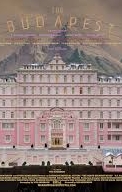PHOTOS & STILLS - GALLERY
VISITOR COLUMN

The Grand Budapest Hotel- Visitor Review
By Ashutosh MohanBehindwoods.com isn't responsible for the views expressed by the visitor in this column. The visitor claims that this column is his/her own. If the column infringes any copyrights that you hold, please email us at columns@behindwoods.com.
If art is immediate engagement with the sublime, The Grand Budapest Hotel is a fabulous work of art that throws you headfirst into a zany and self-evident world for which director Wes Anderson invents his own idiosyncratic rules, laws, and logic.
Within the first five minutes you are transported into the world of the Grand Budapest, a once felicitous hotel in the delightfully fictional Republic of Zubrowka; but this conveyance is not through explanation of what the hotel is or why it must indeed be its own world: it is done through The Author, a Stefan Zweig-like author who, by forcefully asserting that he is of course narrating everything exactly as it happened, suggests that no efforts were spared in making stuff up. We are then shown a gorgeous visual of the Grand Budapest: half painting and half real. It prepares us for something that appears irresistibly real only because it is deliciously whimsical.
Young Zero Mustafa (Tony Revolori) is a lobby boy in the hotel and is working under the tutelage of the charismatic and complicated Monsieur Gustave H (Ralph Fiennes): a man who shags eighty year-old women, maids, dames and also incidentally yearns for a time when men were fine and civilized. Upon the sudden death of Madame D (the eighty year-old woman above), who has left him all his wealth in her latest will, her son Dmitri Desgoffe (Adrien Brody) frames Monsieur Gustave as the murderer and sets upon him a gory private investigator (Willem Dafoe). What follows is a screwball comedy with copious doses of irreverence, high romance, idealism, and brutal murders: fingers are cut off by slamming doors, severed headsin a state of shocked rigor mortis are examined by the police, security guards are massacred with a shaving knife.
It is as if Wes Anderson is entirely bored with making films and has to do something artful in every frame, dialogue, intonation, and sound just to keep him occupied. Like a bored child he endlessly improvises until we end up with a film in which our eyes and ears are constantly craving for moments of neatexperience; and when we think we might just be getting bored with them we are relieved with generous dollops of absurdity and nonsense. Take for example a scene in which Zero rendezvouses his lover Agatha (Saoirse Ronan) and then escapes through the roof and runs away in 2D like Super Mario; or, when anentirely unbelievable notion of a Secret Society of Concierges is rendered obviously real by exaggerating the fact that it is unbelievable: each concierge receives a phone call when he is doing something important and runs to take the call after handing the job off to the lobby boy who carries it out with daft insouciance; or, when—in a tense moment—two cable cars are dangling over a ravine and they rhythmically squeak with different registers in perfect synchronization with the background score; or, when a concierge aspiring for genteelness calls himself Monsieur Chuck. The film is replete with such moments, and if at all there are flaws in the film’s logic or execution, you feel like a smaller person for nitpicking on them.
The list of fine actors in the film is endless but Revolori distinguishes himself with his earnest, deadpan expression and endearing devotion to Monsieur Gustave.
Grand Budapest is not a labor of love—it is a casual daub by an indifferent master; or, that is how Wes Anderson wants us to see the film. But we know better.
ashutoshmohan@gmail.com
Please send your column to columns@behindwoods.com.










